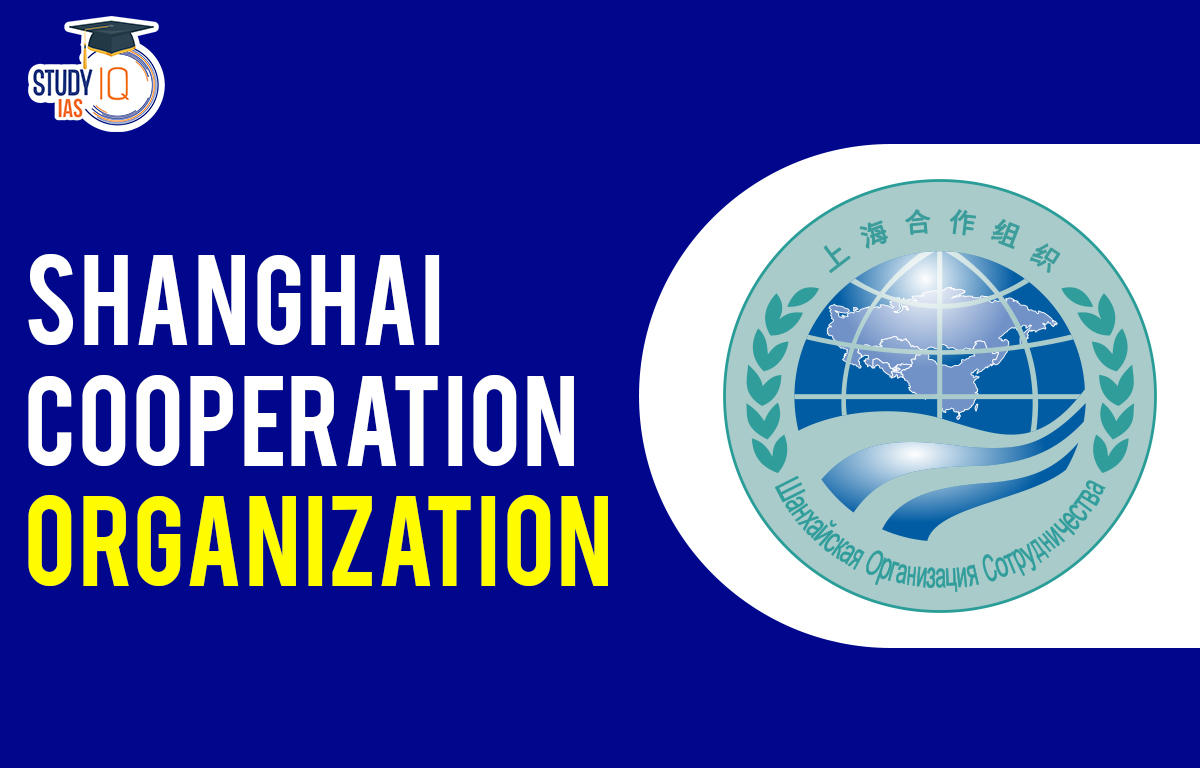Table of Contents
Shanghai Cooperation Organization
A permanent intergovernmental international organization is the Shanghai Cooperation Organization. Keeping stability, safety, and peace in the area is the goal of this Eurasian political, economic, and military organization. In 2001, it was founded. 2002 saw the signing of the SCO Charter, which became effective in 2003.
The Shanghai Cooperation Organization is an important part of International Relation which an important subject in UPSC Syllabus. Students can also go for UPSC Mock Test to get more accuracy in their preparations,
Shanghai Cooperation Organization Background
In 1996, the Shanghai Five—China, Kazakhstan, Kyrgyzstan, Russia, and Tajikistan—created a mutual security pact. On June 15, 2001, the heads of state of these nations and Uzbekistan convened in Shanghai to create a new organization with closer political and economic connections. The SCO Charter was adopted on September 19, 2003, after being signed on July 7, 2002. It now has eight members after adding India and Pakistan on June 9, 2017. Several nations are taking part as partners or observers.
Shanghai Cooperation Organization Member Countries
There are 8 Member States, four Observer States and Six Dialogue Partners:
| Member States | Observer States | Dialogue Partners
|
| China
|
Afghanistan
|
Armenia
|
| India
|
Belarus
|
Azerbaijan
|
| Kazakhstan
|
Mongolia
|
Cambodia
|
| Kyrgyzstan
|
Iran
|
Nepal
|
| Russia
|
Sri Lanka
|
|
| Pakistan
|
Turkey | |
| Tajikistan
|
||
| Uzbekistan
|
Shanghai Cooperation Organization Structure and Working
The Shanghai Cooperation Organization’s highest governing body is the Heads of State Council (HSC). The HSC meets once a year to decide and enact policies regarding all of the important issues facing the SCO. The SCO’s Heads of Government Council (HGC) gathers once a year to review the organization’s priorities for multilateral cooperation as well as pressing economic and other cooperation-related concerns.
The organization’s two permanent bodies are the SCO Secretariat in Beijing and the Executive Committee of the Regional Anti-Terrorist Structure (RATS) in Tashkent. The SCO Secretary-General and the Director of the SCO RATS Executive Committee are appointed by the Council of Heads of State for three years each.
Shanghai Cooperation Organization Benefits for India
With the Central Asian nations that make up our extended neighborhood and with whom India has shared millennia of vibrant, diversified ties, the SCO offers a solid platform for communication. Afghanistan and Central Asia are essential for India’s economic development, connectivity, trade, and security.
India has contributed to increased trade, economic, and cultural interaction within the SCO by placing people at the focus of its efforts. It has helped bring stability and prosperity to the area. India has taken steps to demonstrate its commitment to deepening its relationship with the SCO by engaging in the group in a proactive, optimistic, and constructive way.
Shanghai Cooperation Organization Achievements
Over the past 20 years of its existence, the SCO has developed and enhanced its cooperation idea, operation mechanism, and cooperation areas. The “three evil forces” (terrorism, separatism, and extremism) have been defeated, among other impressive things, in practise. Additionally, the SCO has enhanced economic cooperation between and within its member states as well as throughout the region.
Shanghai Cooperation Organization Challenges
A significant assurance for its future international cooperation is provided by the SCO structure. The regional big power game becoming more intense. Combating terrorism, extremism, and separatism, as well as trafficking in drugs and weapons, illegal immigration, etc. The lack of a strong sense of togetherness among its member states
After expansion, the cooperative pattern transition occurs. SCO decision-making is difficult despite its close proximity to other countries because to the great diversity of its members’ histories, backgrounds, languages, national interests, systems of government, riches, and cultures.
Shanghai Cooperation Organization UPSC
The SCO is frequently referred to as the “alliance of the East” because to its rising key significance in the Asia-Pacific and its role as the primary security pillar of the region. While some nations may join as observers or guests, many others may become full members of the SCO. It may be necessary to alter the SCO’s charter to address shifting geopolitics and demand from neighboring nations.
It is extremely likely that The Charter will grow and get better. The future of SCO is bright, and it may be able to safeguard the future of this region as well. Students can read all the details related to UPSC by visiting the official website of StudyIQ UPSC Online Coaching.





















 WhatsApp
WhatsApp